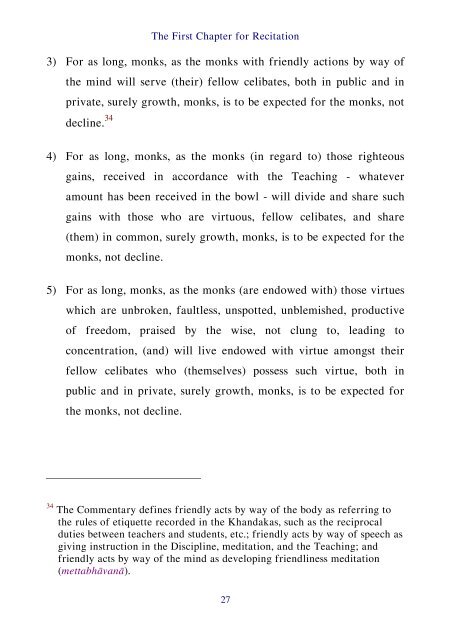The Discourse about the Great Emancipation
An English translation of one of the longest discourses in the canon, detailing the last year of the Buddha’s life, and his final teachings (Mahāparinibbānasuttaṁ, DN 16)
An English translation of one of the longest discourses in the canon, detailing the last year of the Buddha’s life, and his final teachings (Mahāparinibbānasuttaṁ, DN 16)
You also want an ePaper? Increase the reach of your titles
YUMPU automatically turns print PDFs into web optimized ePapers that Google loves.
<strong>The</strong> First Chapter for Recitation<br />
3) For as long, monks, as <strong>the</strong> monks with friendly actions by way of<br />
<strong>the</strong> mind will serve (<strong>the</strong>ir) fellow celibates, both in public and in<br />
private, surely growth, monks, is to be expected for <strong>the</strong> monks, not<br />
decline. 34<br />
4) For as long, monks, as <strong>the</strong> monks (in regard to) those righteous<br />
gains, received in accordance with <strong>the</strong> Teaching - whatever<br />
amount has been received in <strong>the</strong> bowl - will divide and share such<br />
gains with those who are virtuous, fellow celibates, and share<br />
(<strong>the</strong>m) in common, surely growth, monks, is to be expected for <strong>the</strong><br />
monks, not decline.<br />
5) For as long, monks, as <strong>the</strong> monks (are endowed with) those virtues<br />
which are unbroken, faultless, unspotted, unblemished, productive<br />
of freedom, praised by <strong>the</strong> wise, not clung to, leading to<br />
concentration, (and) will live endowed with virtue amongst <strong>the</strong>ir<br />
fellow celibates who (<strong>the</strong>mselves) possess such virtue, both in<br />
public and in private, surely growth, monks, is to be expected for<br />
<strong>the</strong> monks, not decline.<br />
34 <strong>The</strong> Commentary defines friendly acts by way of <strong>the</strong> body as referring to<br />
<strong>the</strong> rules of etiquette recorded in <strong>the</strong> Khandakas, such as <strong>the</strong> reciprocal<br />
duties between teachers and students, etc.; friendly acts by way of speech as<br />
giving instruction in <strong>the</strong> Discipline, meditation, and <strong>the</strong> Teaching; and<br />
friendly acts by way of <strong>the</strong> mind as developing friendliness meditation<br />
(mettabhāvanā).<br />
27


















